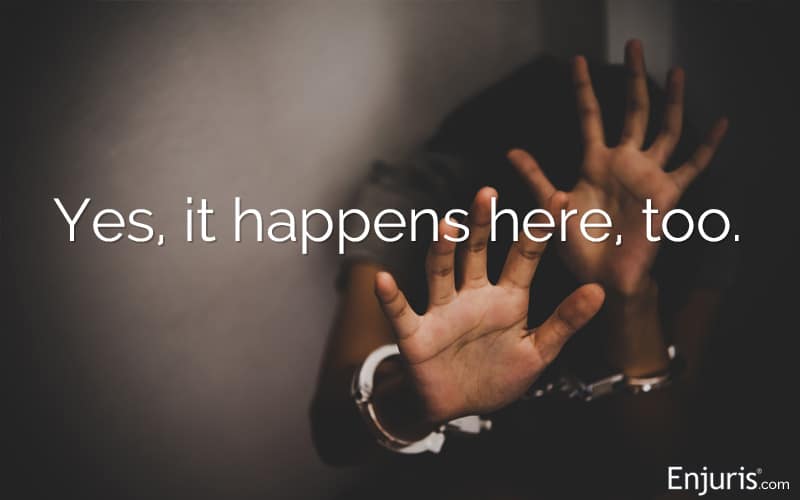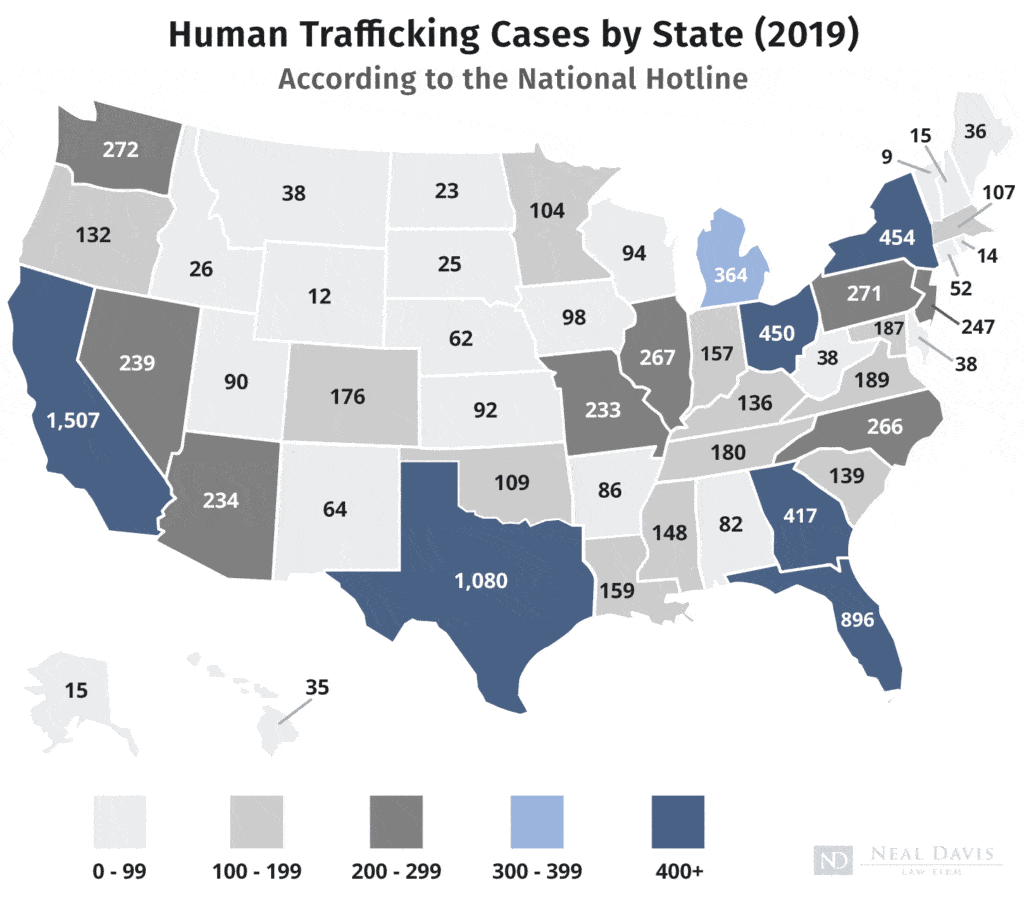
Human trafficking (also known as “modern-day slavery”) may sound like something that happens in the plot of a movie or in far-off parts of the globe, but human trafficking victims know all too well that these crimes occur every day in every region of the United States.
In this article, we’ll take a look at human trafficking, including the legal options that may allow victims to receive financial compensation.
What is human trafficking?
Human trafficking is a crime that involves the use of force, fraud, or coercion to compel a person to provide labor or to engage in commercial sex acts.
The exploitation of a minor for commercial sex constitutes human trafficking, regardless of whether any form of force, fraud, or coercion is used.
Let’s look at both types of human trafficking more closely:
| Type of human trafficking | Definition | Examples |
|---|---|---|
| Labor trafficking | Labor trafficking (also referred to as “forced labor”) encompasses the range of activities involved when a person uses force, fraud, or coercion to obtain the labor or services of another person. | Examples of labor trafficking include domestic servitude and forced child labor. |
| Sex trafficking | Sex trafficking encompasses the range of activities involved when a trafficker uses force, fraud, or coercion to compel another person to engage in a commercial sex act or causes a child to engage in a commercial sex act. | Victims of sex trafficking can be exploited in numerous contexts, including street prostitution, illicit massage parlors, cantinas, brothels, escort services, and online advertising. |
How common is human trafficking?
Across the globe, there are an estimated 24.9 million victims of human trafficking at any given time. Of these, roughly 16 million (64%) were exploited for labor, 4.8 million (19%) were sexually exploited, and 4.1 million (17%) were exploited in state-imposed forced labor.
Human trafficking sounds like something that only occurs in parts of the world far, far away from where you live. Unfortunately, human trafficking in the United States is much more common than you probably think. What’s more, there’s a good chance that a human trafficking crime is taking place right now in your state and community.
Consider the following human trafficking arrest from 2019, but keep in mind that most human traffic crimes go unreported and unprosecuted.
 Source: Neal Davis Law Firm’s report on U.S. Human Trafficking Statistics & Laws by State
Source: Neal Davis Law Firm’s report on U.S. Human Trafficking Statistics & Laws by State
Who are the victims and perpetrators of human trafficking?
Although anyone can become a victim of human trafficking, traffickers typically prey on individuals who are poor, vulnerable, living in unsafe or unstable situations, or in search of a better life.
According to the United States Department of Justice, some of the most vulnerable populations for human trafficking in the United States include:
- American Indian/Alaska Native communities
- Lesbian-gay-bisexual-transgender-questioning (LGBTQ) individuals
- Individuals with disabilities
- Undocumented migrants
- Runaway and homeless youth
- Temporary guest-workers
- Low-income individuals
Victims of trafficking are typically lured into forced labor or sex acts by false promises of love or financial stability.
Just like victims of human trafficking, perpetrators of this unspeakable crime vary. Traffickers can be men or women, foreign nationals or U.S. citizens, family members or complete strangers. What’s more, while some traffickers are gang members or pimps, others have respected jobs, such as diplomats, business owners, and farmers.
What criminal and civil laws are implicated?
Both criminal and civil laws address human trafficking in the United States.
Let’s take a look at the relevant criminal laws first.
Criminal laws and penalties for human trafficking
Several provisions in the U.S. Code address human trafficking by imposing harsh criminal penalties on traffickers. These provisions are contained in Title 18, Chapter 77 of the U.S. Code.
Additionally, all 50 states have passed laws that make human trafficking a felony (beginning with Washington in 2003).
But what about civil laws?
Civil laws and compensation for human trafficking
You may be able to file a civil lawsuit against an individual who facilitated or benefited from human trafficking if you:
- Are the victim of human trafficking
- Are the parent of a minor who is a victim of human trafficking
- Lost a member of your immediate family as a result of human trafficking
In 2003, congress passed the Trafficking Victims Protection Reauthorization Act, which allows victims of human trafficking to file civil claims in federal court against anyone involved in the “recruitment, harboring, transportation, provision, obtaining, patronizing, or soliciting” of a person for human trafficking.
Additionally, most states have passed laws that specifically allow civil claims against human traffickers.
Who can victims of human trafficking sue?
Under federal law (and most state laws), human trafficking victims can file a lawsuit against any person or business involved in the recruitment, harboring, transportation, provision, obtaining, patronizing, or soliciting of a person for forced sex or labor.
While it may seem obvious to file a civil lawsuit against traffickers themselves, most traffickers end up in prison without any money or assets. For this reason, many victims end up suing third parties, such as hotels, massage parlors, trucking companies, and taxi companies.
According to the attorneys for the women, sex traffickers rented rooms at the hotel for weeks at a time. Their criminal activity over the course of three years was “open, obvious, and notorious.” What’s more, at least one staff member at the hotel (a security guard) was complicit in the abuse.
Can human trafficking victims receive compensation?
In most cases, human trafficking victims can receive economic, non-economic, and punitive damages in a civil lawsuit:
- Economic damages are the monetary damages caused by human trafficking (for example, medical expenses, psychological therapy, and loss of income).
- Non-economic damages are the non-monetary damages caused by human trafficking (for example, pain and suffering).
- Punitive damages are intended to punish the defendant in cases where the defendant’s actions were particularly egregious.
In addition to the financial compensation, civil lawsuits have the added benefit of discouraging would-be traffickers, empowering other victims, and uncovering other victims or perpetrators through investigation.
The lawsuit alleged that the “cult” was involved in “despicable human trafficking practices” that harmed her. More specifically, the lawsuit alleged that when Kendra was 11 years old she was forced to cook, clean, and provide child care for the United Nations of Islam. What’s more, she was pulled out of school at the age of 16 and sent to Royall’s home where she was forced to work without pay while enduring physical and emotional abuse.
The U.S. District Court for Kansas awarded Kendra more than $8 million.
What is the statute of limitations?
The term “statute of limitations” refers to the amount of time a person has to file a lawsuit before the lawsuit is forever barred.
Under the federal Trafficking Victims Protection Reauthorization Act, a victim of human trafficking has 10 years to file a lawsuit from the date of the crime, or 10 years after the victim turns 18 if the crime occurred when the victim was a minor.
The statute of limitations for state laws varies greatly depending on the state and the specific law. For example, there is no statute of limitations for human trafficking in Alaska. On the other hand, the statute of limitations in Tennessee is typically 3 years.
It’s a good idea to get in touch with an attorney as soon as possible to preserve all of your legal options.
Are there other types of sex crimes?
In addition to sex trafficking, there are a host of sex crimes that can give rise to civil lawsuits. These include:
- Sexual extortion
- Child pornography
- Statutory rape
- Public sexual indecency
- Sexual assault
- Sexual abuse
- Surreptitious recording
- Voyeurism
- Child molestation
All of these sex crimes have different elements that must be proven and different time limitations depending on the state.
